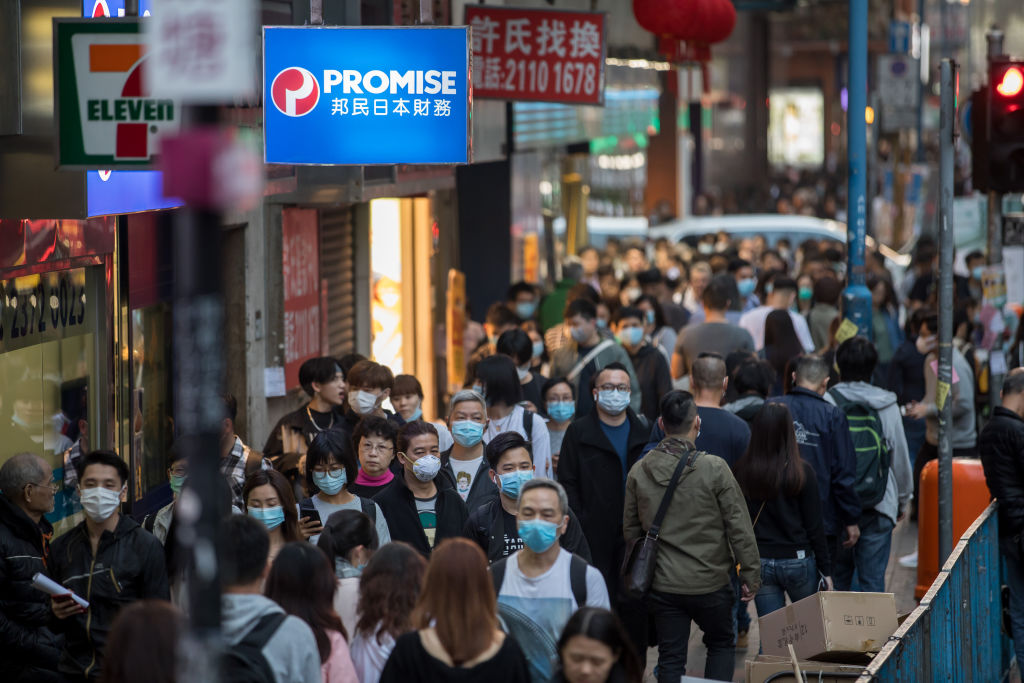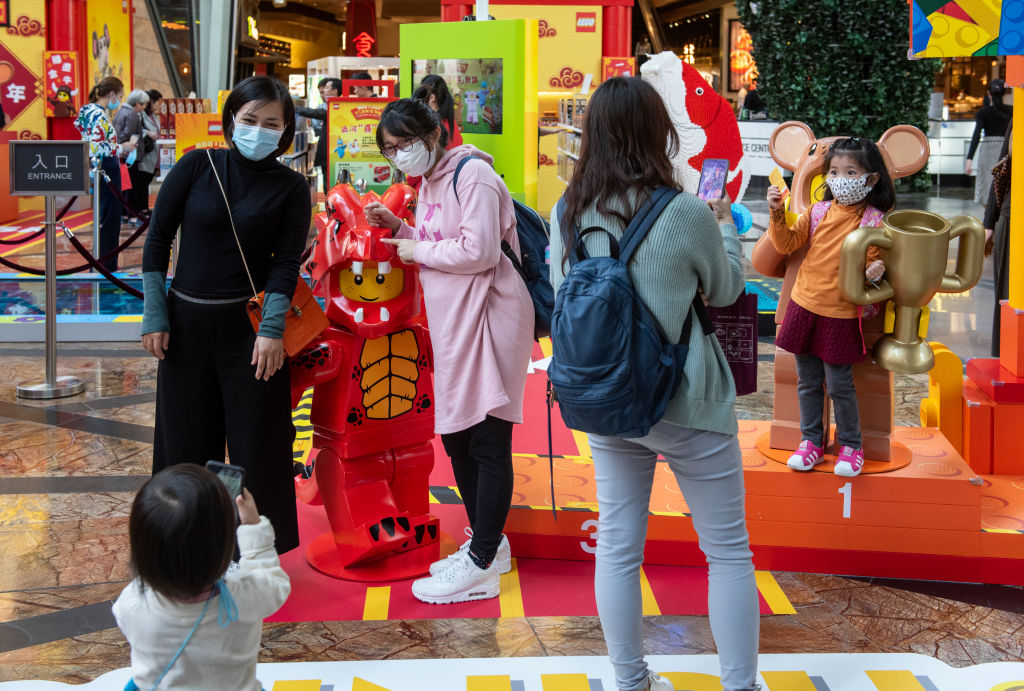For the past week, Hong Kong retail store owner Dora Ho has been wearing a medical mask wherever she goes. She doesn’t let her husband leave the house without one, either.
The couple have a dozen boxes of them at home, and started their stockpile as news reports began to pour in about a deadly, pneumonia-like coronavirus that first emerged in the central Chinese city of Wuhan.
As well as the standard 3-ply and 4-ply masks, Ho has a box of 3M-made N95s, which have been increasingly expensive and difficult to find in Hong Kong since the Wuhan outbreak started grabbing headlines. N95 masks are typically used on construction sites, but they were commonly worn by Hongkongers during the 2003 outbreak of severe acute respiratory syndrome (SARS).
“They’re very hard to breathe in,” says Ho, 35. “But this is just in case things get worse.”

Many in Hong Kong are similarly apprehensive and the streets and subway trains are thronged with masked crowds—ironically, given that the authorities sought to ban face masks at public gatherings in October to deter participation in the anti-government protests that have raged across the city for months.
The heightened concern comes as the number of confirmed cases of the deadly coronavirus in mainland China climbed to 830 on Friday with at least 26 deaths. The virus has spread to Japan, Thailand, South Korea, Singapore, Taiwan, Vietnam and the United States.
Sign up for our daily coronavirus newsletter by clicking on this link, and please send any tips, leads, and stories to virus@time.com.
There have been two confirmed cases in Hong Kong and public health officials have assured residents that there is no evidence of a widespread outbreak.
But it’s easy to see why locals are nervous: they’ve been here before. SARS infected close to 2,000 people in 2003, casting a pall over the city for six months. Years later, relics of that outbreak have remained part of daily life in Hong Kong, such as the ubiquitous use of hand sanitizer (unknown before SARS), or the introduction in restaurants of two pairs of chopsticks at each place setting (one pair to eat with, the other pair to dip into communal dishes when you want to pick up a morsel). At karaoke bars, customers put disposable protective coverings over their microphones to guard against germs. And medical masks, rarely seen outside of hospitals before SARS, are now part of everyday life, even when there isn’t a new coronavirus to contend with.
Read more: Here’s What It’s Like in Wuhan, the Chinese City at the Center of the Deadly Coronavirus Outbreak
SARS hit Hong Kong hard, killing almost 300 in the city out of over 700 deaths worldwide. The crisis also battered the local economy, pushing unemployment to a record high and sending property prices—some of the most expensive in the world—plummeting.
During those months, the normally bustling city turned into a ghost town as residents minimized any unnecessary movement beyond the confines of their homes. Restaurants and hotels stood empty. People stopped greeting each other with a kiss on the cheek—many were even too nervous to shake hands.
Ho was a university student in Hong Kong when SARS broke out. She recalls her classes being canceled and not seeing her friends on weeks on end. “I stayed home most of the time,” she says. “Everyone was too scared to go out.”
‘We’ve been through this already’
Wuhan, home to 11 million people, and 12 neighboring cities are currently on lockdown, with air and rail links suspended. China’s Culture and Tourism Bureau also announced that all large-scale new year festivities during the Lunar New Year will be canceled in view of the outbreak.
But there are concerns that the virus could be spread by the mass movement of millions traveling across the country to visit family during the holiday, which beings on Jan. 25. (Guan Yi, a virology expert at the University of Hong Kong, has warned that the Wuhan coronavirus could be “at least 10 times the scale of SARS.”)
Anna Wong, a 24-year-old civil servant, says she normally goes with her family to Zhongshan, in Guangdong province in Southern China, to visit relatives every Lunar New Year. But this will be the first time she’s spending the holiday in Hong Kong. “We don’t think it is worth the risk,” Wong says.
Chinese authorities were widely criticized for covering up the SARS crisis in 2003. Many believe that under-reporting of cases in the early stages ultimately caused hundreds of deaths that could have been prevented, and while some argue that Chinese authorities learned their lesson Wong is skeptical.
“We’ve been through this already,” she says, echoing the sentiments of many in Hong Kong. “I’m scared because those on the mainland are not aware. They believe everything is under control.”

For Samantha Ng, 55, the situation today has an eerie sense of déjà vu. “The news cycle is dominated with updates about more cases being discovered, and so many people are wearing face masks,” she says. “This is just like in 2002, before we really knew what SARS was.”
Back then, mainland Chinese thronged to Hong Kong and bought up stocks of white vinegar and a Chinese medicinal plant, Isatidis Radix, driving up prices, Ng recalls. Fumigating a room with steamed vinegar, and boiling the plant in water and drinking the concoction, were said to be effective precautions for warding off the virus—claims that were later proved false.
“I think we have all learned from the past, and we are more alert now,” Ng says.
Still, she wears a face mask whenever she leaves the house, and is careful to avoid crowded places. During SARS, she checked her temperature at least twice a day, as advised by her family doctor, even when she was feeling fine. It’s a habit she says she could easily pick up again—after all, she did that daily for almost six months, and taught her then eight-year-old daughter to do the same.
“No one thought SARS would kill hundreds of people,” she says. “It turned Hong Kong into a dead city. I hope we never return to that.”
More Must-Reads from TIME
- Donald Trump Is TIME's 2024 Person of the Year
- Why We Chose Trump as Person of the Year
- Is Intermittent Fasting Good or Bad for You?
- The 100 Must-Read Books of 2024
- The 20 Best Christmas TV Episodes
- Column: If Optimism Feels Ridiculous Now, Try Hope
- The Future of Climate Action Is Trade Policy
- Merle Bombardieri Is Helping People Make the Baby Decision
Write to Hillary Leung / Hong Kong at hillary.leung@time.com